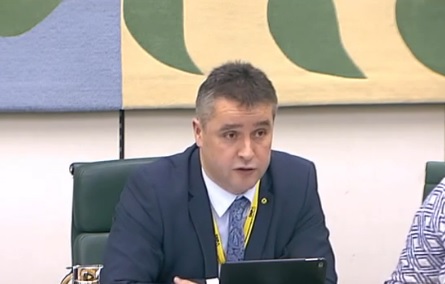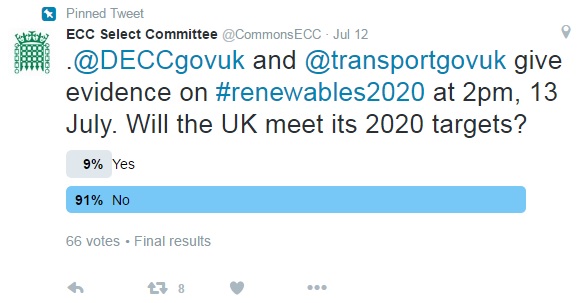
“The UK will miss its 2020 renewable energy targets without major policy improvements” Angus MacNeil, chair of the energy and climate change select committee.
Government failure to cooperate effectively across departments means the UK will miss its 2020 renewable energy targets according to the latest damning report from the energy and climate select committee.
The committee launched an inquiry into the UK’s renewable heat and transport targets – 12% and 10% respectively – after a leaked letter in November from former energy secretary Amber Rudd showed a significant shortfall in the country’s overall target.
It has now confirmed that while the UK will likely surpass its 30% renewable electricity target, success in this sector “may not compensate for underperformance in heat and transport”.
Current progress as of 2015 towards over 15% 2020 renewable energy target (2015):
Electricity (30%) – 22.31%
Heat (12%) – 5.64%
Transport (10%) – 4.23%
Angus MacNeil, chair of the ECC committee, said: “The experts we spoke to were clear: the UK will miss its 2020 renewable energy targets without major policy improvements. Failing to meet these would damage the UK’s reputation for climate change leadership. The government must take urgent action on heat and transport to renew its efforts on decarbonisation.”
The report states that many of the failures to progress towards 2020 are down to government efforts to incentivise the relevant sectors, particularly the Renewable Heat Incentive which has failed to build customer engagement.
It also criticises proposed reforms to the scheme which would refocus it towards heat pumps instead of biomass, which has so far lead the scheme in terms of deployment.
“The government’s proposed reforms to the Renewable Heat Incentive (RHI) are not the optimal pathway to the 2020 renewable heat target. Heat pumps have proven unsatisfactory in actual use, yet are being prioritised over biomass—which has been successful,” the report concludes.
It also states that attempts to engage consumers in the scheme have proved “inadequate” and required a better marketing strategy. These comments echo those made by the failed Green Deal scheme, which suffered from low take-up as a result of poor knowledge among consumers.
Transport has also proved to be a contentious issue for government, with progress actually falling between 2014 (4.93%) and 2015 (4.23%). Efforts to increase the proportion of biofuels have fallen short of while progress in electrification remains slow.
The committee’s main criticism is that the government’s approach in the areas has not been joined up, with heat and renewable transport incentives administered through completely separate incentives and competing for resources.
However, it does state the formation of the Department for Business, Energy and Industrial Strategy creates is an opportunity for greater cooperation and consistency across government. However, it warns that energy and climate change issues could be buried by conflicting concerns, reflecting comments made by committee member James Heappey.
The report’s conclusions follow those from National Grid, which concluded in July that the progress required to meet the EU-set goals is “beyond what can be achieved”.

An ECC committee Twitter poll conducted during the inquiry showed the lack of confidence in the UK’s ability to meet it’s targets. The report states: “Though not necessarily expert opinion, this result suggests that our stakeholders—the wider public and policy community—lack faith in the Government’s strategy.”
Both the ECC committee and National Grid have questioned the government’s commitment to the targets following the UK’s vote to leave the European Union. The report states that Brexit “renders the status of the 2020 targets uncertain” and claims that if the UK misses or reneges on targets “this will undermine confidence in its commitment to future targets”.
MacNeil added: “We agreed our 2020 renewable energy targets as part of the EU but they still have many merits, even as the UK Government prepares for Brexit. If the UK reneges on these targets, it will undermine confidence in the Government’s commitment to clean energy and the climate targets agreed in Paris. Progress has been slow, but this must be taken as a call to action, not an excuse for backtrack.”
The committee therefore calls for the government to reassess its capacity to meet them and, if able, recommit to them notwithstanding its exit from the EU. If not, ministers must set and commit to replacement goals to support the longer-term decarbonisation objectives as effectively as the 2020 targets.
